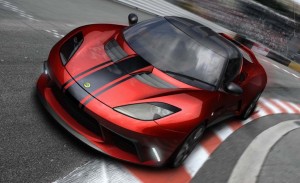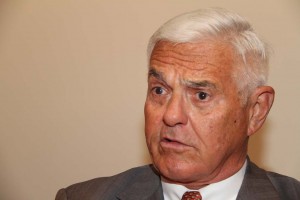
Lotus originally developed the Evora GTE for the Le Mans circuit but had hinted it might do a version for the street.
This story has been updated to reflect the latest development involving the Lotus advisory board.
For long-time Lotus fans it seemed too good to be true: the British maker promising to turn out a whopping five new cars in a five-year burst of activity unlike any period in its long but oft-troubled history.
Well, indeed, it was too good to be true. After discharging Chief Executive Dany Bahar, the automaker’s parent, DRB-Hicom Bhd, has scrapped that ambitious plan and is aiming at what several observers are referring to as a “much more realistic,” meaning downsized, product roll-out.
Meanwhile, former General Motors car czar Bob Lutz confirmed he and the rest of the Lotus advisory board have been terminated as part of the maker’s cost-cutting efforts.
Could Lotus be leaning out its product plans to make the company seem more appealing for a buyer? That’s one possibility, industry sources suggest, new reports surfacing that suggest Germany’s Volkswagen AG might be interested in buying both the Lotus Group but also Hicom’s Malaysian-based Proton.
“In this day and age, with the cost of developing a new vehicle, building the tools and homologating a sports car,” said analyst Joe Phillippi, of AutoTrends Consulting, the Lotus plan to turn out five new product seemed “overly ambitious.”
Lotus shocked the industry when, at the 2010 Paris Motor Show, Bahar announced plans to roll out a wide range of new offerings of sports cars, from entry-level to supercar, as well as the necessary powertrains. Skeptics took note that only one of the show cars on display was more than just a mock-up.
But, until the recent dismissal of the CEO, Bahar continued to insist the program was on track with only a few modest revisions in the timetable.
All that changed when he was “temporarily suspended from his role, to facilitate an investigation into a complaint about his conduct,” Lotus announced in late May.
Earlier this month, following a meeting with DRB-Hicom management, analyst Alexander Chia revealed that the Lotus product program would be reduced to just three vehicles, which the RHB Research analyst described as “much more realistic.”
Hicom, he noted, planned to spend the next six to 12 months working out a new strategy for both Lotus and Proton. The parent has meanwhile pumped in nearly $400 million to keep the British maker going and expects to invest as much as $200 million more by next year. Proton, meanwhile, has taken out about $500 million in loans.
According to Chia, development work at Lotus had come to a virtual halt before the new funds were pumped in.
But Lotus appears to be struggling to bring costs under control. It is not only scrubbing at least two of its planned product programs but taking other steps such as eliminating its high-profile advisory board. That news was announced by former GM Vice Chairman Lutz during an appearance on the Internet video program Autoline After Hours. Lutz had joined the board after retiring from GM two years ago, along with as a gold star panel of other industry notables including Formula One designer Gordon Murray and former BMW North America CEO Tom Purves. The board had been put in place by former Lotus chief Bahar.
While Chia might now be a bit more optimistic about the future for Lotus, others remain skeptical and wonder how long Hicom can continue to try to go it alone with even a scaled-down product plan.
Both the Reuter’s news service and Germany’s Manager Magazin are reporting that Volkswagen might be more than willing to step in. The automaker unsuccessful tried to negotiate a partnership with Proton in 2007 and the publications sight sources claiming VW is now preparing a bid that could give it a minority stake – perhaps even complete ownership of Proton and Lotus.
VW just announced that, after an initial delay, it will move forward with a planned takeover of Porsche, which would bring to an even dozen the number of brands the Group operates. And the maker has shown a willingness to keep going.
“It’s our clear goal to continue the successful (growth)course of past years with great dynamics and stability,” VWAG Chief Executive Martin Winterkorn proclaimed last month. Adding new brands appears to be part of the strategy as VW aims for its goal of being the world’s largest automaker before the end of the decade.
Earlier this year, Fiat CEO Sergio Marchionne publicly declared he had no plans to sell Volkswagen the Alfa brand.
Malaysian-based Proton, in particular, would give VW an added presence in Southeast Asia, a region where VW – and its competitors – see great growth opportunity.
While Lotus doesn’t offer nearly the numbers of Proton it is nonetheless a high-profile brand that appears to appeal to VW’s hard-driving Supervisory Board Chairman Ferdinand Piech. During his tenure as CEO, Piech led VW to acquire Britain’s Bentley and Italy’s Lamborghini, among others, while rapidly expanding the Audi franchise.
-(VW) “I would never be surprised by anything Dr. Piech does, “ said analyst Phillippi. “His middle name must be ‘audacity.’ “If he can make sense out of (buying Lotus) from an engineering standpoint – utilizing a platform (from the VW Group), I wouldn’t be surprised at all.”

